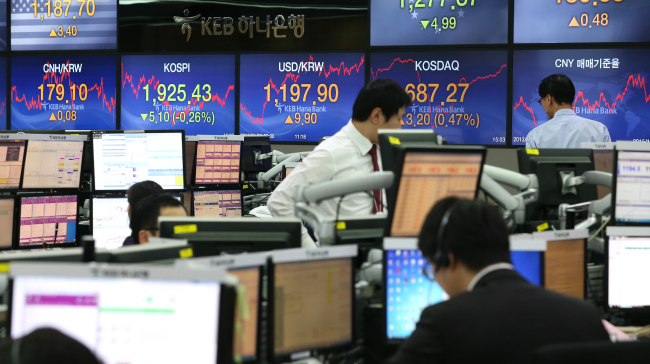North Korea’s purported hydrogen bomb test rocked financial markets in South Korea on Wednesday, bringing down local stocks and currency and putting Seoul authorities on emergency footing again just two days after China’s stock market crash triggered a global market rout.
The South’s benchmark stock index KOSPI dipped 0.26 percent to close at 1,925.43. In the morning, shortly after the news broke, the gauge slid to as low as 1,911.61, but recovered some of the losses in the afternoon. Foreigners unloaded local shares worth a net 108.6 billion won ($90.7 million).
The local currency touched a four-month low against the greenback, as jittery foreigners dumped Korean assets. The won extended its losing streak to five days, ending at 1,197.9 won per dollar, down 9.9 won from a day ago. It was the lowest level since Sept. 8 last year, when the exchange rate stood at 1,200.9 won.
At 10 a.m. Wednesday, the communist North conducted what it claimed to be a successful hydrogen bomb test. The move, which was denounced by the international community, is widely expected to heighten geopolitical tensions surrounding the Korean Peninsula, a key factor for foreign investors to price down South Korean assets.
 |
(Yonhap) |
Seoul officials moved swiftly to calm investors’ nerves, saying past North Korea provocations had only short-term impacts on markets here.
“Judging from the history of North Korean provocations and their impacts on the markets, we expect the current event to play out similarly on the markets,” said Yim Jong-yong, chairman of the Financial Services Commission. He said that stability appeared to have returned on local bourses already in the afternoon trading.
Officials from the FSC, the Financial Supervisory Service, the Finance Ministry and the Bank of Korea held an emergency response meeting in Seoul, seeking to reassure investors. While echoing Yim’s remarks that the impact would be “short-lived,” the officials pledged to stay vigilant against further volatility.
“Market volatility has increased due to China’s stock market crash and the heightened tensions in the Middle East, which all came in the first days of this year. If volatility persists, it could have sizable impacts on markets and the real economy,” said Jeong Chan-woo, vice chairman of the financial watchdog FSC.
By Lee Sun-young (
milaya@heraldcorp.com)






![[Herald Interview] 'Trump will use tariffs as first line of defense for American manufacturing'](http://res.heraldm.com/phpwas/restmb_idxmake.php?idx=644&simg=/content/image/2024/11/26/20241126050017_0.jpg)
![[Health and care] Getting cancer young: Why cancer isn’t just an older person’s battle](http://res.heraldm.com/phpwas/restmb_idxmake.php?idx=644&simg=/content/image/2024/11/26/20241126050043_0.jpg)
